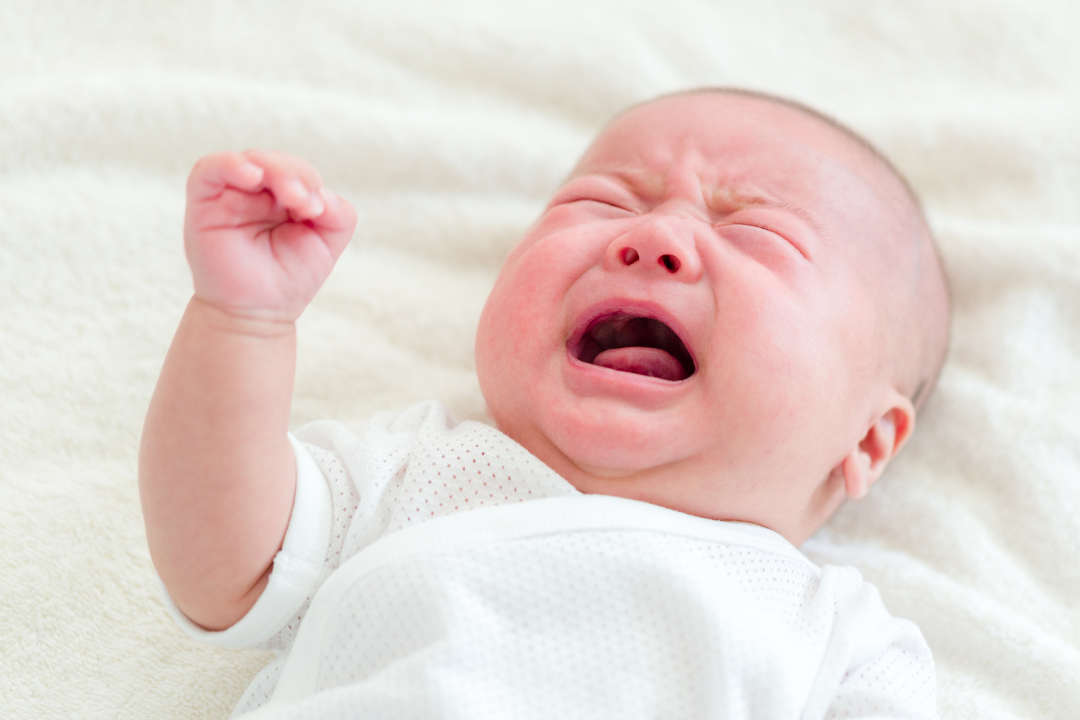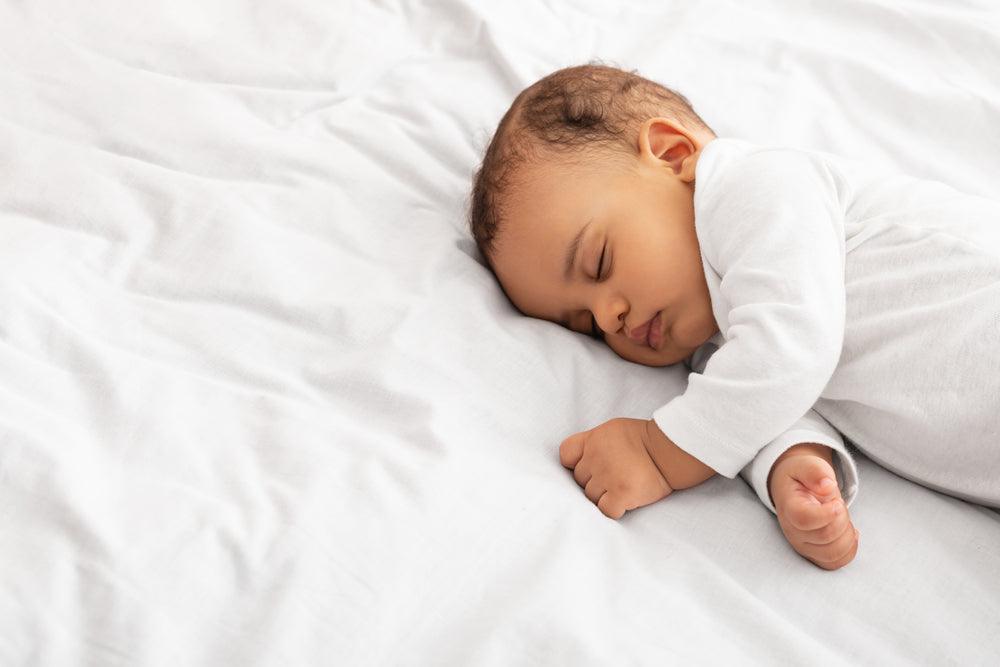The American Academy of Pediatrics (AAP) guidelines suggest that your baby should sleep in your room but not in your bed for at least the first six months of life. The recommendations go on to say that, if possible, parents should room with their babies for the entire first year.
However, a more recent study suggests putting your baby in their own room at four months old may be better for your baby's development and for your family overall.
So, which is it? How long should your baby sleep in your room?
Clearly, the answer isn't as straightforward as we would like. The best we can do is lay out the facts. That way, you can decide what works best for you and your family.
The AAP Guidelines
In 2016, the AAP updated their infant sleep guidelines to better protect against the risk of SIDs and other sleep-related infant deaths. Included in these guidelines is a note about room sharing.
Per the AAP, infants should share a room with their parents for the first six months at a minimum. If the family situation allows, the AAP pushes parents to keep babies in their room for the first year.
They argue that the risk of SIDS is much lower when a parent sleeps in the same room as the child, and they have plenty of data to back this up, at least for the first six months.
Evidence suggests that the risk for SIDS is higher in the first six months of life, especially for babies who sleep in a separate room. SIDS and sleep-related deaths have multiple risk factors, and the AAP encourages parents to be aware of more than just room sharing.
Breastfeeding, for example, significantly lowers the risk of SIDS, and they note that it's far easier to accomplish when your baby isn't too far from your bed. The AAP also recommends back rather than stomach or side sleeping and that parents offer a pacifier before bedtime.
The recommendations go on to say that placing your infant directly on your bed, or soft bedding of any sort, dramatically increases the risk of SIDS. So, the room-sharing recommendation is specific to sharing a four-walled area but not a bed, which is crucial to understand.
The Study That Defies Them
In 2017, Pediatrics, the official journal of the AAP, published a study that seemed to go against the AAP room sharing recommendations. Researchers found that room-sharing between 4 and 9 months decreased the amount of sleep the infants got. It also seemed to lead to risky sleep situations.
The Study Method
Researchers used a randomized controlled trial to observe 230 families throughout two and a half years to perform the study. They encouraged half of the mothers to move their infants out of their rooms at three months old. The other half had nurses come to their homes to talk about the risk of SIDS and help them improve their infants' sleep environments.
Interestingly, the percentage of infants still sharing a room with their parents between 4 and 9 months old didn't differ between the two groups. Over 50% of the infants were in their own room by four months old, regardless of the suggestions they received.
That allowed researchers to study the effects of independent sleeping after four months old. What they found was surprising.
The Study's Results
Infants that slept in their own beds, in their own rooms starting at four months old:
Infants in their own room averaged 10.5 hours of sleep per night, whereas infants who room-shared from 4 to 9 months averaged only 10 hours.
Infants in their own room got 9 hours on average, while room-sharing infants only got 8.3 hours at a time.
Sleep seemed to be worse for infants that stayed in their parent's room after nine months old. Those infants got an average of 9.5 hours of sleep per night. And they only slept for an average of 7.4 hours at a time.
Researchers returned to ask parents about their children's sleep at two and a half years old. At that point, they found that those who were independent sleepers by four months old got an average of forty-five minutes more sleep per night, even as toddlers.
So, infant sleeping habits seem to have long-term effects, which makes some people question whether the AAP uses a big enough lens to make their recommendations.
The AAP Response
At the time the room-sharing study was published in Pediatrics, Dr. Rachel Y. Moon, who helped write the AAP guidelines, issued an editorial response.
In it, she points out that long periods of sleep for infants might not be a good thing. That's because "inability to arouse" is a hypothetical cause of SIDS. Of course, more extended periods of sleep don't necessarily mean it's hard for your baby to wake up. So, this is an area that needs more research.
Dr. Moon also says that the study's data may suggest that parents need to focus on consistent and early bedtime routines that encourage better sleep. She explains this by pointing out many of the four-month-olds who slept independently seemed to have better bedtime rituals overall.
Those bedtime routines may be why they're getting more sleep, and room sharing might have less to do with it.
Though she admits establishing a solid routine may be a challenge in a shared room environment, more guidance for parents on how to get past those challenges may be better than eliminating the room-sharing advice entirely.
Making An Informed Decision
Approximately 3500 babies in the U.S. die each year due to sleep-related incidents, including SIDS. Given that about 3.6 million babies are born in the U.S. each year, these tragedies are relatively rare. However, the AAP and parents obviously hope to avoid any infant death that could be preventable.
So, it makes sense for the AAP to create conservative guidelines that help parents do everything possible to prevent sleep-related deaths. Unfortunately, their guidelines on room sharing may not be steeped in as much evidence as some of their other suggestions.
The risk of SIDS is much higher in the first six months of life, and the researchers behind the 2017 sleep study argue that there's not much evidence for room sharing past that point. To them, the twelve-month protocol seems overly conservative, if not arbitrary.
The researchers also pointed out that putting a baby in their parent's bed increases the risk of SIDS per the AAP. And, it would seem that parents are much more likely to fall asleep with their baby in their bed if the child is already sleeping in the parent's room.
They also argue that sleep deprivation for the parents may be a much more significant risk to the baby and the rest of the family than SIDS is. Sleep deprivation could lead to accidents and make parents more vulnerable to mental disorders such as depression.
Plus, many babies begin to experience separation anxiety at around nine months of age when they develop an understanding of object permanence. That means transitioning to an independent sleeping situation between nine months and one year old can be challenging if not near impossible.
It's far easier for most parents to transition their child to their own room at four to six months old when the baby is less likely to have attachment issues.
The AAP is coming from a good place. They want to protect all infants from SIDS and sleep-related deaths, which isn't a bad thing. However, critics argue that using such a narrow perspective to set health guidelines is problematic.
They say that the AAP and parents should use a more family-centered approach that doesn't just account for the risk of SIDS but also weighs in other factors like sleep deprivation for the parents and the infant's overall development.
Currently, the guidelines leave parents in a challenging position. No one wants to increase the risk of SIDS for their infant, but some of the recommendations could come at a high cost. So, parents have to weigh the risks and benefits for themselves.
So, How Long Should Your Baby Sleep In Your Room?
Deciding how long your baby should sleep in your room isn't easy. Ideally, you should weigh the AAP recommendations heavily but also consider what works for your family situation.
If you find that keeping your baby in your room deprives you of sleep or that you're falling asleep with your baby on your bed, you might want to consider placing them in a nursery sooner than the AAP recommends.
That said, if keeping your baby in your room isn't causing any issues, you may choose to follow the AAP recommendations in full.
Talking to your pediatrician can help you decide. They know you and your baby better than the AAP. Together, you can work out a plan to minimize SIDS risks while doing what works best for your family.
Check out our video baby monitors to be aware of how many hours your baby is sleeping.







